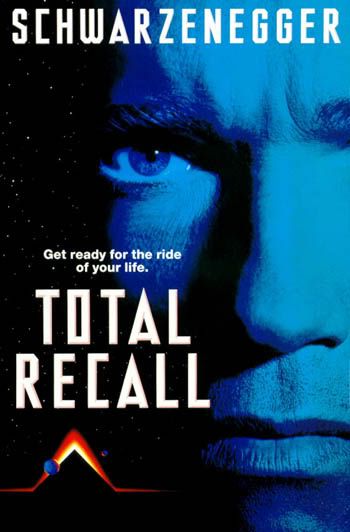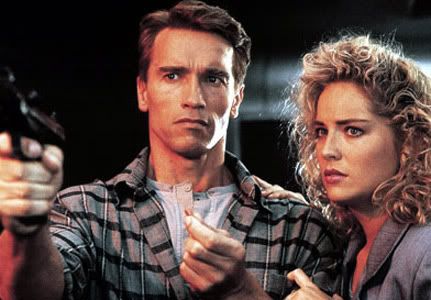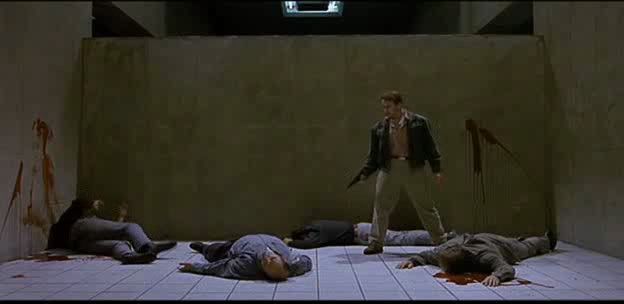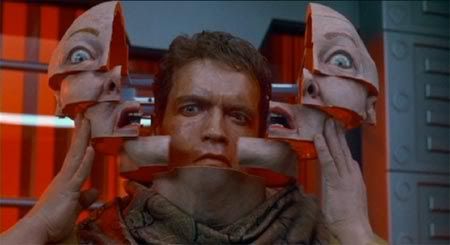
[audio:http://www.blueinkalchemy.com/uploads/totalrecall.mp3]
Philip K. Dick is what I would consider a luminary of the genre of science-fiction. He wrote quite a few stories that dealt with concepts like free will, identity and the nature of drug abuse. Somewhere between the adaptation of Do Androids Dream of Electric Sheep? that became the sci-fi classic Blade Runner, and the adaptation of The Minority Report that became… well, Minority Report, we have a little story called We Can Remember It For You Wholesale. The story had, as its themes, the nature of memory, the blurring of the borders between fantasy and reality in our minds, and Mars. Some of these themes survived the adaptation process to appear in the film Total Recall, and while the movie isn’t quite the visionary and atmospheric masterpiece of Blade Runner, it at least doesn’t take its premise in entirely the wrong direction, like Minority Report does.

Arnold Schwartzenegger is Douglas Quaid, a mild-mannered construction worker who dreams of something more, specifically the recently colonized Mars. He can’t afford to take his hot blonde wife on vacation, however, and while she seems content to stay home and lavish him with attention, he can’t help longing for something more. He eventually seeks out a company called Rekall, that offers him the vacation of a lifetime in his head – he can go to Mars, be anybody he wants, do just about anything. He chooses the false memories that cast him as a secret agent. However, the doctors find he’s already undergone a memory replacement procedure, and suddenly our inexplicably built hero is fighting to get free from the facility screaming at the doctors for blowing his cover. They fix up the damage, but it’s too late: Quaid has realized that he is, in fact, a deep cover secret agent who is either working for the evil mining conglomerate that controls Mars or carrying the key to Mars’ liberation. Or is he?
Total Recall was directed by Paul Verhoeven, who brought us Starship Troopers and the truly excellent RoboCop. I’ve heard his World War II Jewish vengeance flick Black Book is up there with these films, and it’s on my queue somewhere. Anyway, when you go into a Verhoeven entry, you can expect gratuitous bloody violence, shameless sex appeal that borders on exploitation, undercurrents of social commentary that are both pointed and hilarious, or a combination of all of the above. Sometimes, this doesn’t work when the elements are weighted too much on one side (*cough*Showgirls*cough*), but Total Recall is an example of the Verhoeven formula working, and working well. It’s not quite as effective as RoboCop, nor does the undercurrent buoy up the rest of the film as it does in Starship Troopers, but it still makes for surprisingly good entertainment.

“Wait… you want me to put this where?”
Arnold can get ragged on from time to time for some of his performances. I for one am still slightly traumatized by Batman & Robin. But his particular brand of on-screen presence works well in Total Recall. He’s not an overt badass, like his character in Predator, nor is he the cold, detached and utterly unstoppable Terminator. Douglas Quaid is, for all intents and purposes, an innocent man, completely blindsided by the turn of events that has him on the run from covert operatives and trying to get his ass to Mars. His confusion and attempts to go with the flow of events rather than glowering or brooding make him far more sympathetic and engages the audience surprisingly well. In spite of all of the violence and special effects in this space rock opera, the affair is held together by an element that’s surprisingly human.
I call Total Recall a “space rock opera” because it doesn’t have the gravitas of a genuine space opera like the original unadulterated Star Wars. Its tone, when it isn’t trying to mess around in your head, is decidedly more Flash Gordon than 2001. The bad guys never seem to hit the good guys with their fully automatic weapons, industrial mining equipment is easily re-purposed as death machines and on a world of mutations, space hookers tend to get ‘helpful’ enhancements like an extra breast. It’s definitely more science fantasy than science fiction, and while that does lead to minor issues later, for the most part it works as an engine of whimsy and bloodshed to drive the story.

“Um… clean up? Aisle 5?”
And for two acts, that story hums along quite well. We’re never completely sure if what’s happening to Doug is really happening or if he’s still strapped to the bed back at Rekall. Hints come along here and there to point in one direction or another, especially towards the end of the second act when a doctor shows up along with Quaid’s wife. That aforementioned expression of somewhat bewildered confusion Arnold wears for most of this adds a bit of necessary weight to the games the story play with the audience’s minds. For the majority of the film, Total Recall seems to be, at least on an intellectual level, trying to be just a touch more than your typical sci-fi shoot-em-up.
Unfortunately, the third act comes down with a nearly terminal case of stupid. Not to give anything away, but the subplot of all of the events possibly being figments of Quaid’s imagination is pretty much dropped and all but the last minute or so of running time are devoted to your typical Arnold action pick-and-mix. There’s a clever little bit with a portable hologram, but other than that you’ve got one-liners, improbable science, the most laughable depiction of decompression I’ve ever seen and endless faceless goons deposited onto the scene straight from the Stormtrooper School of Marksmanship. It just gets a little tedious after a while. I mean, if you’re an Arnold fan, this stuff is candy. Too much of it for me tends to make my teeth hurt.

“Playing Mr. Freeze gave me a headache this big.”
Still, Total Recall is like Starship Troopers in more than just classic sci-fi inspiration and themes that transcend the majority of the film’s action. The two films are similar in that the good bits, by and large, outweigh the bad. It’s not without some flaws that will have you laughing out loud or rolling your eyes, but it’s at least got that space rock opera charm in its favor along with the subtle questions on our perception of reality. All in all, it’s a decent ’90s sci-fi action entry whose rough patches are smoothed over with unique story elements rooted in the works of one of the best science fiction writers of our time. Arnold fans, Dick fans and Verhoeven fans should definitely add this to their Netflix queues.
One last note of interest: This film was originally rated X. Verhoeven had to cut the film with some different camera angles and trim some of the violence to get it downgraded to R for general release. It was also one of the last films to use miniatures extensively, instead of relying on CGI. I think that might add to the film’s charm, and let’s face it, CGI might have failed in bringing us things like that triple-breasted hooker. Because let’s face it, that’s what people remember. It’s like remembering the cake scene as the best part of Under Siege. Or thinking of Labyrinth as a movie about David Bowie’s… pants.
Josh Loomis can’t always make it to the local megaplex, and thus must turn to alternative forms of cinematic entertainment. There might not be overpriced soda pop & over-buttered popcorn, and it’s unclear if this week’s film came in the mail or was delivered via the dark & mysterious tubes of the Internet. Only one thing is certain… IT CAME FROM NETFLIX.



Leave a Reply